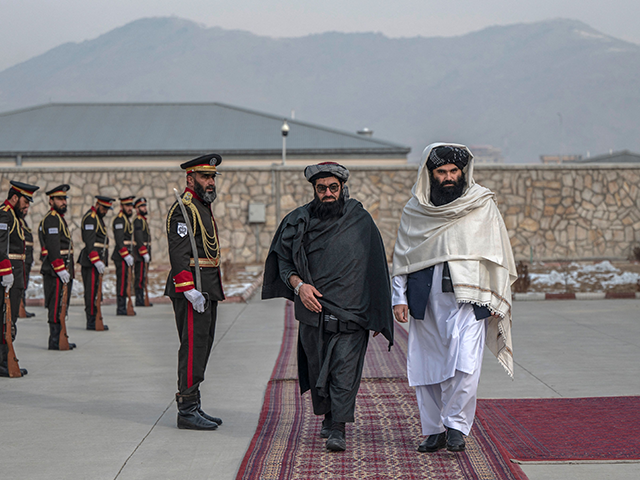A power struggle looks to be brewing in the junta ruling Afghanistan, as Interior Minister Sirajuddin Haqqani — an FBI Most Wanted terrorist, New York Times published commentator, and leader of the Haqqani Network — lodged a bit of veiled public criticism against Taliban Supreme Leader Hibatullah Akhundzada over the weekend.
The Haqqanis already have a great deal of power in the Taliban government and might be maneuvering to take even more.
Haqqani was giving a speech at the graduation ceremony for an Islamic religious school in eastern Afghanistan when he remarked that “monopolizing power and hurting the reputation of the entire system are not to our benefit.”
“This situation cannot be tolerated,” he said.
This was fairly stern language for anyone in the Taliban movement to direct, however obliquely, at the person who has a monopoly on power, Supreme Leader Akhundzada.
Haqqani further mused that Taliban leaders should display “patience, and good behavior, and engagement with the people” in order to “soothe the wounds” of Afghanistan.
This also struck observers as a dig at the famously reclusive Akhundzada, who is the religious authority and political force behind such unpopular Taliban edicts as excluding women from education and employment.
The Times of India (TOI) translated some more of Haqqani’s remarks and noticed him complaining about the Taliban imposing policies that create gaps between “the system and the people,” which give the regime’s adversaries an opening to “exploit” that rift and “defame Islam.” Given Akhundzada’s status as the Taliban’s religious leader, this reads as a very pointed dig at his aloof theocratic approach.
Akhundzada’s toadies certainly seemed to think Haqqani was taking a swing at the Supreme Leader, as Taliban spokesman Zabihullah Mujahid rebuked Haqqani for his remarks in an equally oblique manner, without using the interior minister’s name.
“If someone criticizes the emir, minister, or any other official, it is better – and Islamic ethics also say – that he should express his criticism directly and secretly to him,” Mujahed said. Akhundzada is the “emir” of the “Islamic Emirate of Afghanistan.”
“If anyone moves against the Islamic Emirate, this is not tolerable,” grumbled Taliban Justice Minister Abdul Ghani Faiq, cautioning Haqqani that he might be flirting with treason.
A few other senior Taliban officials have grumbled in public about the fanatical decrees of Akhundzada and his coterie of hermit clerics, who rarely spend time in the capital of Kabul and seem to have given little thought to the business of actually running the country they conquered after President Joe Biden’s disastrous withdrawal in August 2021.
“If we don’t improve the quality and quantity of the education system and do not update it, we will never succeed,” ventured Taliban Deputy Prime Minister Abdul Salam Hanafi, himself more a member of the Taliban’s theocratic wing than a Haqqani pragmatist, in remarks last week that were taken as implicit criticism of the ban on women in higher education.
TOI threw in Taliban Defense Minister Mullah Mohammad Yaqoob, the son of the Taliban’s late founder Mullah Mohammad Omar, as another critic of Akhundzada’s policies.
Foreign diplomats who have spoken with Yaqoob say he is chafing at Afghanistan’s isolation from the world community, which has been prolonged and intensified by Akhundzada’s brutish treatment of women.
“Such a statement from powerful people like Sirajuddin Haqqani shows clearly that there are factions within the Taliban. There is a majority and there is a minority, but unfortunately, that minority is more powerful than the majority,” political science lecturer Hamza Momain Hakimi of Kabul’s Salam University told TOI.
Some analysts reviewing the spat between Haqqani and Akhundzada concluded it was unlikely to develop into a serious challenge against the Supreme Leader’s power, while others noted Haqqani, Yaqoob, and other disgruntled Taliban leaders have large enough armies of loyal followers to start a civil war if they truly want to seize power.
Sirajuddin Haqqani would also have the money and organizational skills of the Haqqani Network behind him. The Haqqanis are based out of Khost, the city where Sirajuddin felt bold enough to deliver his veiled public criticism of Akhundzada.
The Biden administration bizarrely attempted to claim the Haqqanis were totally separate from the Taliban in the chaos after Biden’s withdrawal disaster, an absurd fiction that swiftly collapsed when numerous people named “Haqqani” became senior officials in the Taliban regime. The two extremist organizations are closely allied and deeply entwined, and if anything, Western security analysts believe they have merged even more thoroughly since the fall of Kabul.
The Haqqani Network does have some distinctive features, however, including deep ties to al-Qaeda and other international terrorist organizations, strong support from the unpleasant security apparatus of Pakistan, and a more practical approach to the business of insurgency, including an emphasis on making money to fund the Taliban’s operations during the American presence in Afghanistan.
Sirajuddin’s gripes would suggest the Haqqanis are growing a little frustrated with the Taliban theocracy’s lack of interest in matters of state, and perhaps they are less confident than Akhunzada and his council of mullahs that Afghanistan needs nothing from the rest of the world.
In May 2022, Voice of America News (VOA) noted the bitter paradox that Sirajuddin Haqqani, one of the world’s most wanted terrorists, has become “one of the main, if not the main, interlocutors for the international community in Afghanistan,” as U.S. Institute of Peace analyst Asfandyar Mir put it. It would be ironic indeed if a coup from Haqqani became the best hope for Afghan women to escape from deranged theocratic oppression.

COMMENTS
Please let us know if you're having issues with commenting.